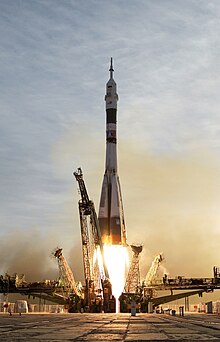Launch vehicle

A launch vehicle or carrier rocket is a rocket used to take a payload from Earth's surface through outer space. This can be to another place on earth (Sub-orbital transportation), or into space. Sub-orbital vehicles aren't as powerful as orbital vehicles must be. They use more than one stage so that they have enough delta-v performance. Many different rocket fuels can be used, and some rockets have solid rocket boosters attached.
Most launch vehicles are expendable, which means that they can only be used once. This means that lots of expensive equipment is lost, but it also means that the launch vehicle can carry a heavier payload.[1] SpaceX has developed a partly reusable rocket, called the Falcon 9. It is also developing a fully reusable rocket called Starship. The first stage of this rocket can land and be relaunched.[2] Parts of the Space Shuttle were also reusable.[3] There are many different types of launch vehicle. The vehicle that is used depends on the spaceport, the mass of the payload, and the orbit that the payload is being launched to. Many countries try and build their own rockets as part of their national space programs.[4]
References[change | change source]
- ↑ "Expendable Launch Vehicles". spacetethers.com. Retrieved 2019-05-07.
- ↑ Mack, Eric. "Reused SpaceX Falcon 9 rocket makes history with third launch and landing". CNET. Retrieved 2019-05-07.
- ↑ Spaceflight, Tim Sharp 2017-12-11T19:02:00Z. "Space Shuttle: The First Reusable Spacecraft". Space.com. Retrieved 2019-05-07.
{{cite web}}: CS1 maint: numeric names: authors list (link) - ↑ House, © Future Publishing Limited Quay; Ambury, The; Engl, Bath BA1 1UA All rights reserved; number 2008885, Wales company registration. "How many countries have rockets capable of reaching space? | Space Facts – Astronomy, the Solar System & Outer Space | All About Space Magazine". www.spaceanswers.com. Retrieved 2019-05-07.
{{cite web}}: CS1 maint: numeric names: authors list (link)
